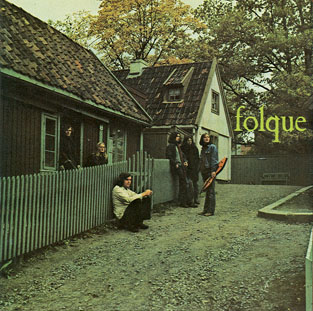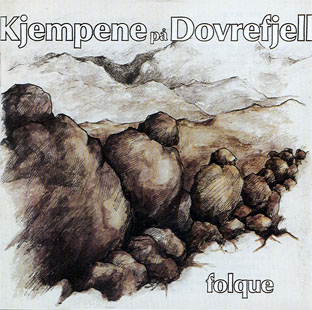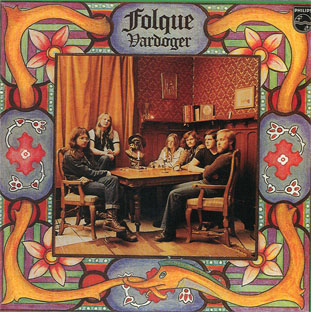
Week of November 11, 2007

Personnel:
Morten Bing - Mandolin, Guitar, Bouzouki, Banjo, Dulcimer
Eilif Amundsen - Vocals, Banjo, Guitar, Dulcimer, Mandolin
Lisa Helljesen - Vocals
Trond Villa - Fiddle, Viola, Guitar, Vocals
Trond Øverland - Bass, Flute, Piano, Vocals
Jørn Jensen - Vocals, Guitar, Dulcimer
Lars Helljesen - Electric & Acoustic Guitars, Vocals
Morten Jacobsen - Drums
Jenn E. Mortensen - Vocals
Øyvind Rauset - Fiddle, Harmonium, Piano, Organ, Harpsichord, Synthesizer
Per Vestavik - Bass
Roald Thomesen - Bass, Background Vocals
Pål Søvik - Drums
Albums:
Folque - 1974 Philips 6317 0; CD: PAN PACD011 1993
Kjempene På Dovrefjell - 1975 Philips 6317 034; CD: PAN PACD015 1999
Vardøger - 1977 Philips 6317 046; CD: PAN PACD016 1999
Dans, Dans Olav Liljekrans - 1978 Mai 7802
Fredløs - 1980 Mai 8001
Landet Ditt - 1981 Talent TLS 4046
Sort Messe - 1982 Strawberry SRLP 11

Pioneered by British groups such as Fairport Convention, Pentangle and Steeleye Span, the folk-rock movement was blooming in the early seventies. Not surprisingly, this also inspired musicians in the rest of Europe to examine their own heritage of traditional folk music. The most important contributors to this genre in Norway were a group appropriately named Folque. They formed in Oslo in 1972 with the aim of making a Norwegian form of folk-rock, using guitars and banjos instead of the traditional treatment with Hardanger fiddle or solo vocals. Their first album, ‘Folque’ (1974), also included adaptations of two Scottish folk songs (among them "Allison Gross" in a similar arrangement to the 1973 Steeleye Span version, although with Norwegian lyrics), but for the future they stuck to Scandinavian material. For this reason, ‘Kjempene På Dovrefjell’ (1975) and ‘Vardøger’ (1977) are usually considered their best albums, offering great insight into Norwegian folklore, i.e. medieval ballads, old Norse poems set to music, fiddle instrumentals and traditional dance music. Their musical ability is impeccable, highlighting fiddle, mandolin, dulcimer and electric guitars. The arrangements always function well, meaning that the bass and drums do not disturb the original rhythm and rhymes. On top of this, Lisa Helljesen had a clear and strong voice (a bit similar to Maddy Prior in Steeleye Span and Mandy Morton in The Spriguns), perfectly suitable to the music. There is no better starting place than ‘Vardøger’, where their own blend of folk-rock was fully developed.

After some personnel changes, Folque signed to the political left-wing
label Mai after their Philips contract expired. Jørn Jensen and Trond Villa were
later involved in Kong Lavring and the group Folk & Rackare (along
with Swedish musicians). ‘Dans, Dans Olav Liljekrans’ (1978) revealed the
new line-up to be as musically competent as the previous one, but the new female
vocalist Jenn E. Mortensen had a rougher voice (and a strong North-Norwegian
regional accent) that might be disturbing to those who dislike her more
aggressive attitude (less suitable to Folque's music, in my opinion). ‘Fredløs’
was a transitional record with a wider musical span than their previous records.
Their last two original albums contained increasing numbers of self-penned
compositions, ‘Sort Messe’ (1982) being dominated by the competent
songwriting of Morten Bing.
Folque were undoubtedly the most influential Norwegian folk-rock band and among
the best in Europe, on a par with Malicorne in France or Ougenweide
in Germany.
Taken from Scented Gardens of the Mind - A guide to the Golden Era of Progressive Rock (1968-1980) in more than 20 European Countries, by Dag Erik Asbjørnsen, Borderline Productions, ISBN 1-899855-12-2